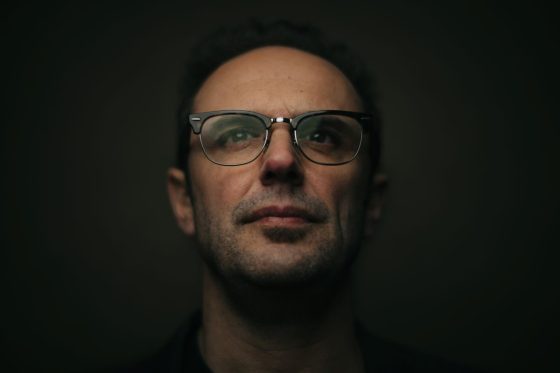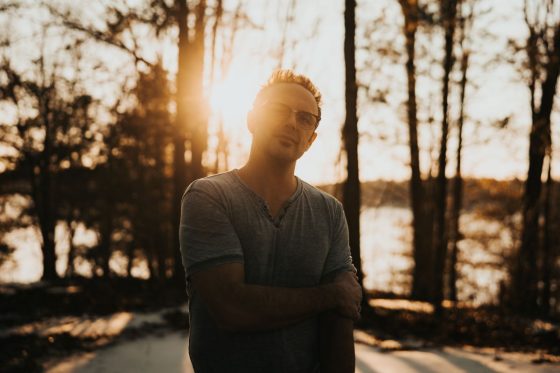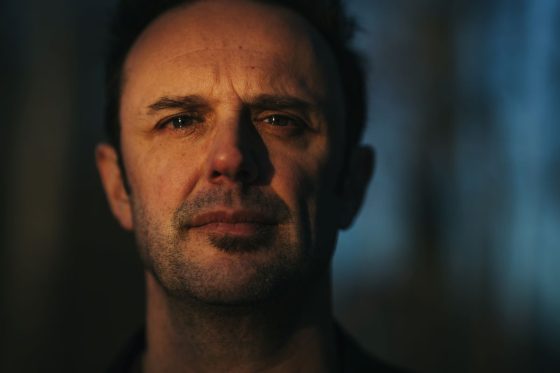
It’s a week before Christmas in Western Massachusetts and Mark Erelli is driving to the dog park. His new album, Lay Your Darkness Down, is filled with songs that urgently address his personal will to move forward. The album comes out the first week in February, so this should really be the best of times. But things are not quite that simple. In 2020, he was diagnosed with retinitis pigmentosa, a disease that ultimately leads to functional blindness. “I just lived my life the way that I wanted to and I didn’t know, I didn’t really have any sense that anything was amiss until the summer of 2020 when I was on a gig, outdoor show,” he said. “I had, unbeknownst to myself, set up in front of the stage out of the lights because when we set up it was daytime. We were all spread out ’cause it was the pandemic and even the band was socially distancing.
“I came out and looked down at my guitar getting ready to play a solo and I could not see any of the details. I couldn’t really see where the frets were. I couldn’t see the dots on the side of the neck. I couldn’t really even see what strings my fingers were on. I was just completely devoid of any markers or landmarks. I made a bunch of mistakes and I just thought that I had set up in front of the lights, and I was like, ‘Oh, note to self, pay attention to the lighting at a gig’. Then, when I was behind the wheel a couple of weeks later and I went into a tunnel in Boston and I lost the road because there were no taillights in front of me to follow, I thought, ‘Okay, something is very wrong’, and that’s when I went and got checked out.”
What he discovered shouldn’t have been a surprise, but somehow human beings have a way of blocking out unpleasant information. “My mom has RP, but it wasn’t something that I was really aware of in my day-to-day life at the time because she was diagnosed after I left home,” he said. “I had moved on and was living my life out and about and it just felt like this very freak … It didn’t feel related to me in any way. It was like, ‘Oh, this is this weird thing that just happened to my mom’, and it was unfortunate, but I wasn’t really thinking about the genetic component of things. I think when you’re young and you’re moving out into the world to make your own way, you’re really not thinking about, at least I wasn’t thinking about anything that tied me to any other kind of history.

“I think we should never underestimate the human capacity to live in denial. That is well documented and it happens every day. I think just as much as I didn’t want to see myself as being held back at a young age by anything that my parents were going through, I think from their end, they didn’t want to even entertain the thought that something that they had been dealt, a card that they had been dealt would inhibit or affect me in any way.”
Erelli’s diagnosis came when he was able to go back to work after the first wave of the pandemic. He finally thought about being able to find a way out of the horrible situation he and his family had been living through. Coming out of that mindset only to be confronted with RP had to be devastating. “When I was first diagnosed, I definitely had just a deep descent into catastrophic thinking that this was the end of my career, and this was the end of me being able to do what I love to do,” he said. “I thought for sure, ‘How am I going to be able to manage this?’ So, it took the better part of a couple of years, I think, honestly, to be able to talk about it in less than catastrophic terms.”
It’s not often easy to admit that you have choices when confronted with the realities of what Erelli was going through. “I think when I got my diagnosis I was like, “Okay, this is just one more thing that we have to fight against to do the thing that we love, and what’s the alternative?” he said. “The alternative is to not do it.
“For the first time in my life, my adult life, I had had a little taste of what that felt like during the pandemic and I just knew that it wasn’t something I could really sustain. I had to find a way to do it. So it looks more positive from the outside than it probably felt at times. Honestly, it’s just a sheer force of will sort of situation. Sometimes I flag in that area, but for the most part I’m like, ‘Yeah, we’re doing this because we can’t not do it’.”
Already the transformations have been profound. “The changes that are immediate are intense night blindness,” he adds. “I’m on a sunny day here at an outdoor dog park and I can see everything fine with my glasses on. I have 20/20 vision in my central of field vision is relatively unaffected thus far. But in RP it starts with losses to your peripheral vision and your night vision. I definitely have lost a lot in that area. I can’t really see in the dark. That might not be a problem if I was a ‘civilian’, I could just make sure where I was when the sun went down was a place that I could be safely. But in my work, 75 to 85% of my working conditions are the conditions that I’m probably legally blind or in some cases just fully blinded. If I come from a brightly lit stage into a backstage area that doesn’t have lights on the floor to guide me or something, it’s just black.
“I can’t see people, I can’t see furniture, I can’t see stairs that I might fall down. The night blindness is very intense and it’s very contextual. It really depends on where the light is coming from. I can experience what’s akin to night blindness even in low light conditions that don’t seem like low light conditions. For example, if I walk into a room and there’s a window across the room from me and someone is standing in front of the window, they will be completely in silhouette, fully black. If I’m standing in front of the window looking at someone coming into the room, I can see them fine.”
One of the challenges for Erelli has been staying positive in a situation that by its very nature is particularly hopeful. It’s not easy putting a good face on things that clearly aren’t the kind of situation that one expected to be in. “My wife and my family and my musical community has been just beyond supportive and beyond helpful,” he said. “I also have kids, so I don’t really have the luxury of expressing all the anger I have at any given moment because they are looking at me to see how I deal with not just this, but just any emotional setback. What kind of example am I setting for them if I visibly lapse into anger or despair at the drop of a hat? I have to provide some sort of useful example for them. I think really, it’s just the case of that expression smiling makes you happy.

“It’s just constantly orienting yourself towards trying to be hopeful and be positive and to be patient with yourself and to be accepting of where you happen to be at any point in time, and it is a choice. I’m not made that way. It’s just something I have to choose every day. Occasionally, I don’t do great at choosing it, but most of the times I’m all right. It’s not all the time, but I do have to make that choice so that the kids don’t learn that, ‘Oh, this is how you deal with things when life gets hard’, that you crumble or you get angry at it and lash out at everyone around you. You can do that on occasion, but it’s not really helpful to live like that.”
Working as a touring musician only makes the challenges that Erelli has to face that much harder. “I have to play with other musicians or someone else that drives me, so I have dealt with it just using guys in my band who are musically and emotionally supportive already and as I’ve said before, have been fantastic,” he said. “I’ve met a couple other dads here in Melrose, Massachusetts where I live that are very, very big music fans. Some of them even have past life experience with the music business in terms of either playing or being on the road.”
Finding a driver can be especially challenging. Music fans can very often be exactly the wrong choice. “It is challenge that I’m still trying to figure out because it has to be someone that is quote, unquote, ‘cool’, and is also a great driver,” he said. “It can’t really be like a fan that is going to want to just talk the entire time. The same way that I would want to talk if I was driving Bob Dylan around or something. It’s got to be someone that can let me have space to rest up if I need to rest up. So you’re perceptive to realize that it is a delicate balance and I’ve got a few people that have passed the test, but I could always use more.”
Erelli’s upcoming release, Lay Your Darkness Down is a collection written before and during the discovery of his retinitis pigmentosa. Yet others were written after learning about his blindness. Despite that it’s a remarkably positive and uplifting collection. “So, the title track, some of the songs on the record were written before I knew and including the title track,” he said. “The title track, to me, was all about how choosing hope in the face of great darkness and times where it just seems like challenges were all around you. So, like so often happens, it’s fret or natural in a way. I don’t understand it, but the songs get to places before I do sometimes, or they, I’m grappling with things in songs before I actually know that I’m dealing with them in my own life. So, there was a lot of that on this record. Stuff like the title track ‘Sense of Wonder’ and ‘Love Wins in the Long Run’ I think were all pre-diagnosis songs. When I started writing stuff that was more directly related to my diagnosis, like ‘You’re Gonna Wanna Remember This’ or ‘You’ or ‘Is It Enough?’ That stuff, it just was amazing how those songs, dovetailed with the ones that were written in the wake of my diagnosis.
“I think the reason the record maybe doesn’t feel like it’s solely about that is because this was a big thing to go through and it was a defining thing, but it’s not the defining thing. It’s one part of my life and I am fortunate to have a very rich and varied life. So, the album comes, I think, across as rich and varied in its subject matter. I like to tell people these aren’t really songs about blindness or going blind. They’re songs that were written from a perspective that I really could only have accessed going through what I’m going through. They’re not necessarily about the act of going blind, but they’re about the emotions and the observations and the things that you are able to see now that you have been dealt a certain hand.
“Anytime you go through something big, it’s not just one emotion. Yes, there’s the catastrophic thinking we were talking about, but there’s also moments of relief and joy and beauty and awe. It was important to me that I present a full range of emotions because that’s really what I was feeling. With a song ‘Sense of Wonder’ I just thought it was very important to present this sense of awe and appreciation of the world that I observe around me in whatever capacity I can observe it. The record ends up being more multi-dimensional than just 10 songs written in the depths of catastrophic pessimism. No one wants to listen to a record like that. I don’t even want to make a record like that, so I’m really pleased with how spirited and multidimensional it sounds.”
What Erelli makes clear is a philosophy about life that is remarkable positive in spite of the things he’s going through. People always have choices to make. “We’re all very close to momentous things happening to our lives, good and bad,” he said. “If you look around at any city or anything, it’s a miracle that anything works. You get on the highway and you think, ;How are we all figuring this out together and no one’s getting hurt?’ I think the veil is thinner than we realize, and in some ways, a lot of ways modern life is designed to distract us from that, that basic truth. But my diagnosis reminded me of that and provided this very concrete, visceral reminder that it really is tenuous, and it really is not a given. It’s a rich and healthy and happy life. It’s not a given.”
There are moments on Lay Your Darkness Down that are simply remarkable, regardless of the time and conditions they were written under. One in particular is a line on ‘Fuel for the Fire’, which was written at the beginning of the pandemic “You can’t live in fear, but you can use it as fuel for the fire”. “I watched the thing that I love to do more than anything just go away,” Erelli explains. “Then I got this diagnosis and I thought, ‘Oh, maybe I’m not going to be able to do this anymore’. One reaction is paralysis, and one reaction is defeat and euphemism. Then conversely, you can use it as a way to hold fast to the things you believe in and the things that you love and the things that you love to do, and to embrace a more solution-oriented mindset, so you can use that fear to a more healthy end, as opposed to just letting that fear curtail your mindset or your actions.”
Despite all the hardships that Mark Erelli is going to be facing as he moves forward, he remains positive and hopeful. While it’s easy to fall into despair, he’s consciously choosing to go in a different direction. There are challenges ahead, that much is clear, but his refusal to be dominated by what he’s facing proves that at the end of the day hope is the answer that resonates for him.
